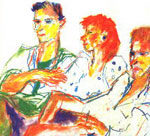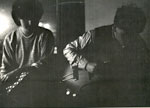We Shall Win...
| |

|
So where were we? Ah yes, Vic Godard had been identified as the strangely subversive figure leading an audacious assault on the bastions of crass, gothic and orthodox rocky horrors.
And yet there were other figures leading the rebellion too, advocating a resurgence of inventive melodies and imagination, dreaming of strangely subversive new songs being played on daytime Radio 2. One of these leading lights was Simon Booth. I am not sure how kindly history has been to Simon. It's hard to remember the last time I heard anyone mention him. Sometime soon after Vic changed the world with 'Stop That Girl' (well ...) Simon was instrumental in putting together Weekend, with Alison Statton fresh from the Young Marble Giants' quiet revolt. Merging Alison's cool insouciance and sexiness, with a hint of be bop, swing and latin flair, Weekend were occasionally as great as Francoise Hardy and the Carpenters. People like Gilles Peterson still credit them with alerting a lot of young punks to the possibilities of jazz. Simon took the jazz thing a little further with his side project Working Week. Somehow he and Working Week are viewed by some as the epitome of faceless club culture, recycling a kind of ersatz ï50s jazzy boho cool, peddling pop as fashion conscious entertainment and little else. Which is as absurd as it is unfair. Simon Booth did appropriately get to work with Vic Godard on the set of songs that spelled T.R.O.U.B.L.E but it was in connection with another Victor that he and Working Work created something special that should ensure a place for them in the pop pantheon. The great Working Week moment was a rousing rendition, or remarkable performance, of Victor Jara's hymn of Popular Unity, 'Venceremos', from the days of Allende and the Chilean people's revolution. It was a song of freedom and defiance, and once again in a very different way suggested great things could be achieved. One of Simon Booth's co-collaborators on that performance of 'Venceremos' was Robert Wyatt. I have just been reading a great interview with Robert in the latest issue of The Wire where he talks about the failure of the left to appreciate the value of popular song. I don't know how popular you can say Robert has been, but over the past 30 years he has created some of the most moving and powerful music. He's been a mod, the avuncular hero of punk explorers, protest singer, and gentleman. And I'm sitting here listening to 'The British Road' and 'Mass Medium' from Old Rottenhat, close to tears at the sadness and defiance of the music, and I don't want to know about any bunch of back to basics rockers creating an unholy row. One of the other voices that contributed to that rendition of 'Venceremos' was that of Tracey Thorn's. I am one of those people for whom Tracey's voice can still produce unexpected shivers down the spine. I love her and we should never ever forget the remarkable nature of the music she produced as part of the Marine Girls, where they turned every rock'n'roll cliché upside down. |

|
Strangely it was with
Tracey's future partner Ben Watt that I really became aware of Robert Wyatt,
due to his contributions to the gloriously moving Summer
Into Winter EP. Those records that Tracey Thorn and Ben Watt were part of at Cherry Red, Lazy
Ways, A Distant Shore, and North Marine Drive, still share an extraordinary defiant fragility, and still seem so evocative of quiet contemplation. This was lovely, literate, elegaic music which has not been matched.
Tracey came from a punk background, via Postcard Records and the Buzzcocks, while Ben was scholarly and steeped in folk and jazz and was keen to talk about John Martyn and Roy Harper. Together they somehow never matched their potential, and I have trouble remembering any of their Everything But The Girl compositions. Eden is a lovely record though, and it is nice to see Simon Booth appropriately among the contributors. Strangely so was Charles Hayward of punk explorers This Heat, which I suppose brings us back to Robert Wyatt and his contributions to the golden age of Rough Trade, and recordings by the Raincoats, Viv Goldman, and Scritti Politti. Interestingly I would argue that the same scene's dabbling with easy listening can be summed up as The Gist sounding like Gallagher & Lyle being a good thing, while Scritti's smug Steely Danisms are a very bad thing. And if you understand the difference you understand what can be so great about pop music. Again perhaps unkindly Everything But The Girl is seen as being the epitome of young couple dinner party background music. Yet Tracey and Ben were the ones really going out of their way to enable groups like Felt and Hurrah! to play to much larger audiences. I haven't forgotten. So good luck to the reinvented Ben as respected house DJ and club culture leading light. One of the first Everything But The Girl collaborations was on a lovely version of The Jam's 'English Rose', and Paul Weller joined them onstage at the ICA for his first public performance following the brave and correct decision to disband The Jam. At that time Paul felt inspired by the possibilities of casting off the restrictions of the rock format. Like many people he was inspired by reading Colin MacInnes' Absolute Beginners, and realising the mod thing grew out of modern jazz, thus making connections to old music that seemed incredibly liberating. He had great fun with some of the early Style Council recordings, and it was appropriate to see Ben Watt and Tracey Thorn contributing to 'The Paris Match' and inspiring the sound of songs like the lovely 'Headstart To Happiness'. Listening again to the Style Council's Café Bleu (and I forgot Subway Sect's Chris Bostock is on there!), it's striking that songs like 'You're The Best Thing' and 'My Ever Changing Moods' (as well as being some of Paul's great solo songs) have become universal middle-of-the-road/easy listening radio favourites in a way that our freedom fighters like Vic Godard and Simon Booth could only dream of. I do like the fact that Paul still gets to record with Robert Wyatt. I remember hearing a story once that Paul had got into John Coltrane's Ole because Robert had said the mods used to dance to the title track. Ah but they still do, Robert, they still do. And the Swingle Singers did get to sing with the Style Council, but that's a different story. © 2003John Carney |